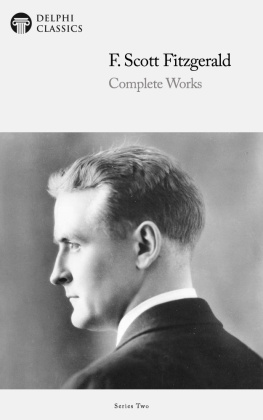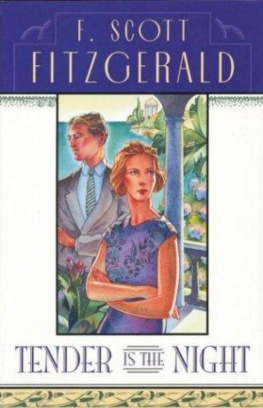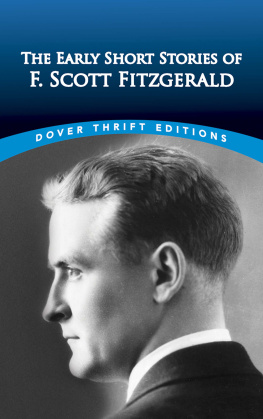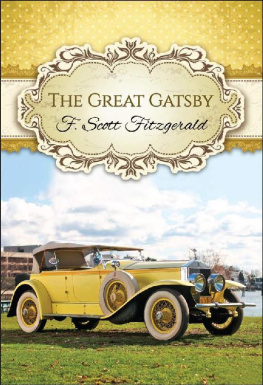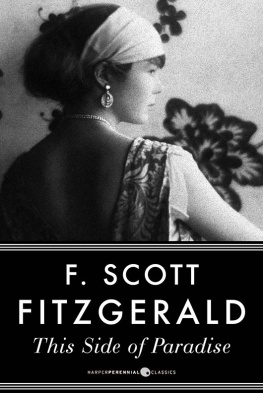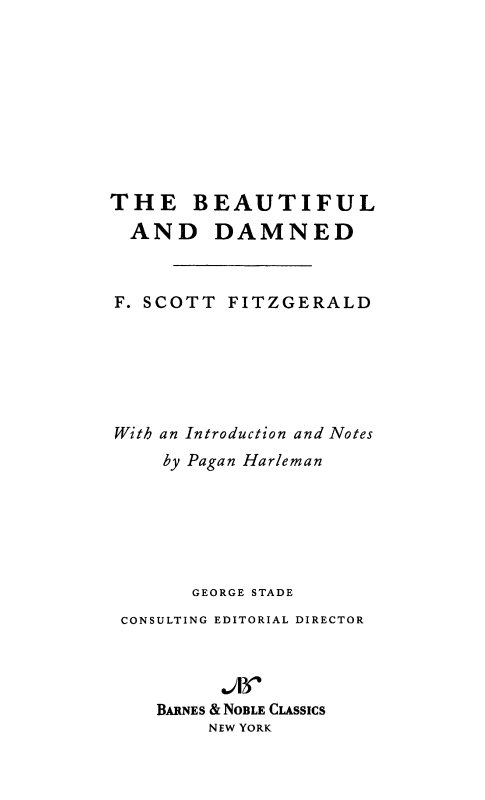
Table of Contents
FROM THE PAGES OF
THE BEAUTIFUL AND DAMNED
In 1913, when Anthony Patch was twenty-five, two years were already gone since irony, the Holy Ghost of this later day, had, theoretically at least, descended upon him. Irony was the final polish of the shoe, the ultimate dab of the clothes-brush, a sort of intellectual There!yet at the brink of this story he has as yet gone no further than the conscious stage.
(page 7)
He found his way slowly over the jostled evening mass of Times Square, which the chariot-race and its thousand satellites made rarely beautiful and bright and intimate with carnival. Faces swirled about him, a kaleidoscope of girls, ugly, ugly as sintoo fat, too lean, yet floating upon this autumn air as upon their own warm and passionate breaths poured out into the night. Here, for all their vulgarity, he thought, they were faintly and subtly mysterious. He inhaled carefully, swallowing into his lungs perfume and the not unpleasant scent of many cigarettes.
(page 24)
Here I sit, young Anthony, as Ill sit for a generation or more and watch such gay souls as you and Dick and Gloria Gilbert go past me, dancing and singing and loving and hating one another and being moved, being eternally moved. And I am moved only by my lack of emotion.
(page 44)
People invariably chose inimitable people to imitate.
(page 71)
Between kisses Anthony and this golden girl quarrelled incessantly.
(page 110)
Dont let the victor belong to the spoils.
(page 154)
Listlessly Anthony dropped into a chair, his mind tiredtired with nothing, tired with everything, with the worlds weight he had never chosen to bear. He was ineffectual and vaguely helpless here as he had always been. One of those personalities who, in spite of all their words, are inarticulate, he seemed to have inherited only the vast tradition of human failurethat, and the sense of death.
(pages 177-178)
They damned the books I read and the things I thought by calling them immoral; later the fashion changed, and they damned things by calling them clever.
(page 205)
That spring, that summer, they had speculated upon future happinesshow they were to travel from summer land to summer land, returning eventually to a gorgeous estate and possible idyllic children, then entering diplomacy or politics, to accomplish, for a while, beautiful and important things, until finally as a white-haired (beautifully, silkily, white-haired) couple they were to loll about in serene glory, worshipped by the bourgeoisie of the land.
(page 225)
Educations a great thing, but dont let it go to your head. Keep on the way youre doing and youll be a good soldier.
(page 271)
Do you think Im particularly happy? he continued, ignoring her question. Do you think I dont know were not living as we ought to?
(page 303)
He turned his blood-shot eyes on her reproachfullyeyes that had once been a deep, clear blue, that were weak now, strained, and half-ruined from reading when he was drunk.
(pages 328-329)
Out inthe shimmee sanitarium
The jazz-mad nuts reside.
Out inthe shimmee sanitarium
I left my blushing bride.
She went and shook herself insane,
So let her shiver back again
(page 351)
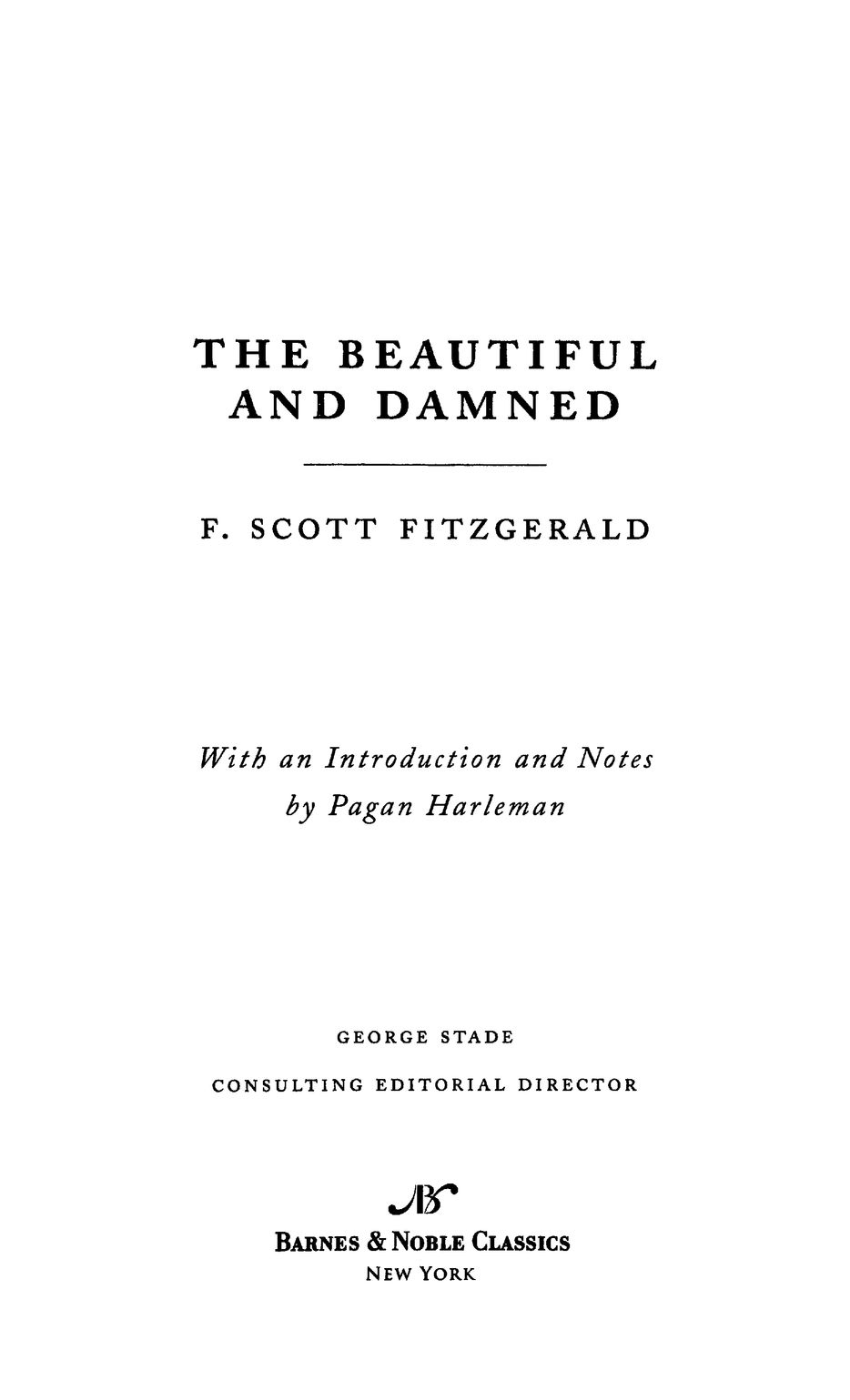
F. SCOTT FITZGERALD
Francis Scott Key Fitzgerald was born in St. Paul, Minnesota, on September 24, 1896, to Edward and Mollie McQuillan Fitzgerald. His father was an unsuccessful businessman who came from an old family with roots in Maryland. His mother was the daughter of an Irish immigrant who built a successful wholesale grocery business in St. Paul. Scott was named after his fathers distant cousin, the author of the Star-Spangled Banner, and his mother was proud of the family connection to the Keys. Before Scott reached school age his fathers wicker furniture factory had failed, and the family moved to upstate New York to follow Edwards sales job with Proctor and Gamble. In 1908 Edward lost his position, and the family moved back to St. Paul; from that point on McQuillan money supported them.
At a young age, Scott showed a talent for writing: At thirteen he published his first story in his school journal. In 1911 he transferred to an elite Catholic prep school in New Jersey, where he published three stories in the schools literary magazine and wrote several plays. Fitzgerald enrolled in Princeton University in 1913, where he contributed to campus magazines and wrote scripts and lyrics for campus musicals. His devotion to extracurricular activities forced him to leave Princeton because of poor grades, although the reason recorded in official records was poor health. After the United States entered World War I, he enlisted in the army; while stationed at a military camp in Kansas, he began writing The Romantic Egotist, his first novel.
After the war, Fitzgerald was discharged from the army, never having seen active service. He revised his novel and renamed it This Side of Paradise; Charles Scribners Sons published it in 1920. That same year Scott married the willful, unpredictable Zelda Sayre, whom he had met several years earlier while stationed at an army base in Alabama. Fitzgeralds first novelimmensely popular with the war generationbrought him instant fame, although many critics of the day debated its literary merits. He quickly developed notoriety as a carouser and a playboyimpressions he did little to diminishbut his reputation for heavy drinking and continual partying belied his writerly discipline, as evidenced by meticulous revisions of his novels and the numerous short stories he wrote throughout his life. In 1922 he followed his successful debut as a novelist with The Beautiful and Damned, a tale about a couple whose lives end in dissipation while they sue for a large inheritance. In his early works Fitzgerald explored a theme he would return to repeatedly: the effects of wealth and power on the people who possess them.
After the birth of their daughter, Scottie, the Fitzgeralds lived a peripatetic life for many years, settling in Europe for periods and then residing in America. In Paris Fitzgerald met Ernest Hemingway and other American expatriate writers, whom Gertrude Stein was to dub the lost generation.
In 1925 Fitzgerald published his masterpiece, The Great Gatsby. Written while the author was living in the French Riviera, the story of the parvenu Jay Gatsby was more a critical success than a financial one, and Fitzgerald continued to support his extravagant lifestyle through frequent, and well-paid, magazine contributions. But his literary fortunes changed following publication of The Great Gatsby. Although he published a collection of short stories in 1926, he did not produce another book until 1934, when Tender Is the Night, on which he had labored for years, was published. Meanwhile, his domestic life deteriorated as he sank deeper into alcoholism and Zelda became increasingly unstable. Zeldas emotional collapse in 1930 was precipitated by maniacally intense ballet studies; the remaining years of her life were spent in and out of hospitals.
Tender Is the Night was a commercial failure and received mixed reviews from the critics. Fitzgerald spent the years following its publication drunk and dissolute; he chronicled this period in the Crack-Up essays. As his literary fame diminished, he worked as a Hollywood scriptwriter and wrote short stories; in 1939 he began work on his final novel,
Next page

